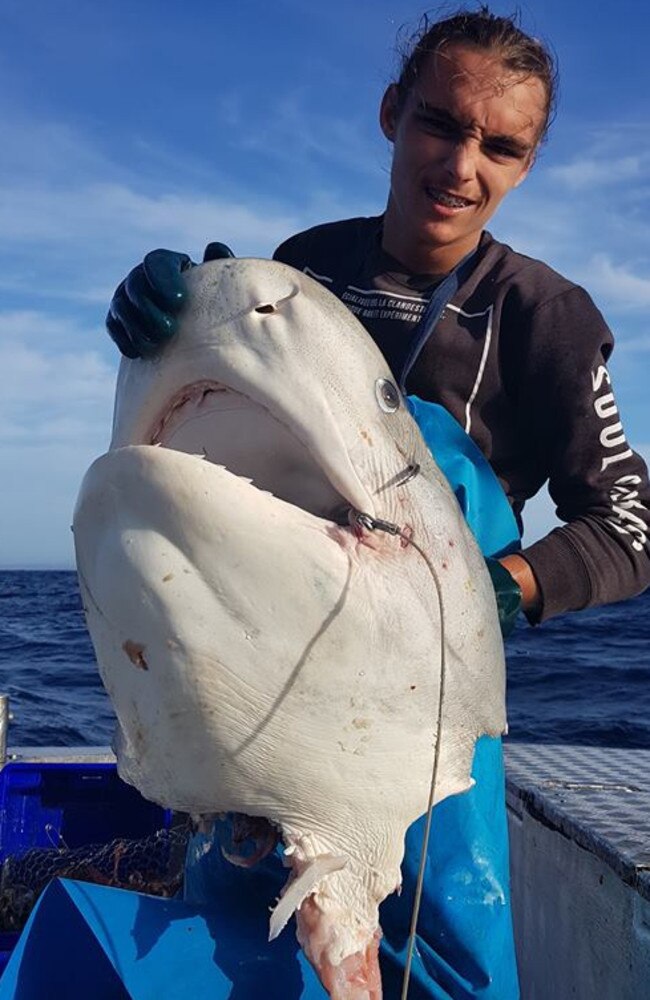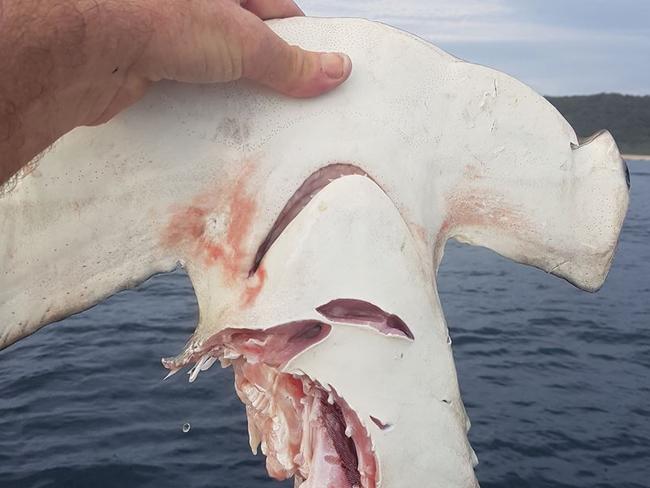Reduced shark catch numbers leads to spike in ocean predators
A decision to reduce shark catch numbers for NSW fishers to just 500kgs a week has not only helped protect the number of bronze whalers, bull sharks, and makos but led to feeding frenzy with sharks turning on each other. WARNING: GRAPHIC IMAGES
NSW
Don't miss out on the headlines from NSW. Followed categories will be added to My News.
- Massive 2.5m shark caught near popular Sydney beach
- Walsh Bay residents push for fishing ban off piers
In his 30 years of fishing, Jason “The Trapman” Moyce has never seen anything like it. Each time he tries to land a shark, it’s like a tug of war, with another shark chasing his catch and then eating it.
The commercial fisherman from the South Coast town of Bermagui said he was flat out landing a whole shark rather than just a head, or at the least, without massive a chunks missing. And most frightening, the sharks being eaten are themselves huge.
“The consistency of the attacks is just crazy at the moment, it’s hard to get one on board without it and it’s nothing I’ve seen before in my 30 years of fishing,” the 46-year-old said.
“It’s been out of hand lately, the population of sharks on the east coast has exploded.”
Last month he and deckhand Jasper Lay caught a bronze whaler only to have it eaten on the way up by a big mako shark, which then arrived boat side as a head attached to the line, the rest was in the belly of a much bigger shark.

DELVENE DELAYNEY IN FIGHT TO SAVE SMALL SCHOOL
OLIVIA NEWTON-JOHN BACKS MEDICINAL CANNABIS USE
“That was a 300 kilogram mako, it ate the smaller shark and we were fighting that and then something bigger ate it and only the head came up,” Mr Moyce said.
While great whites, hammerhead, and grey nurse sharks are protected, bronze whalers, bull sharks and makos are a legal commercial catch, but limited to 500 kilograms a week.
Sharks numbers internationally are threatened due to overfishing, mainly around Asia where Shark fin is a delicacy and the heavily fished northern hemisphere, but fishermen say the numbers in Australian waters are recovering well.
Mr Moyce does not target sharks often, but of the ones he has caught in the past two months, 15 have been attacked between being hooked and being pulled into the boat.
The Department of Primary Industries (DPI) has reduced the shark catch for NSW fishers from two tonne a week to 500kgs which equates on average to just two sharks.
Many commercial fishermen like Dave Woods from Ballina have walked away as a result.


“They reduced the catch to 500kg and it didn’t even cover my expenses so I walked away. I was catching 25 to 30 sharks a week and I did it for 16 years, but know I don’t know anyone who catches them, so that has got to mean more sharks,” Mr Woods said.
And it doesn’t surprise him that sharks are eating sharks.
“When I wanted to catch a shark, I used other shark as bait. They are the biggest cannibals you can come across,” he said.
Joel Merchant from Tweed Heads also gave up his shark fishing permit in December.
“There’s that many of them now that we have been restricted. You stop harvesting something for so many years and it’s uncontrolled and they’ve increased a huge amount,” Mr Merchant said.

Head of the Professional Fishermen’s Association Trisha Beatty confirmed the restricted catch limit meant “basically it’s not economically viable” for a lot of her members.
In the 2018 Shark Assessment Report, figures showed in 2006—07 total commercial shark catch was around 9,057 tonnes, compared with around 5,750 tonnes in 2014—15.
In NSW in 2006-07 there were 747 tonne caught, a figure reduced by 72 per cent to 205 tonne caught in 2015.
“The fishermen will confidently tell you they are seeing more sharks than ever before, they say they are in such healthy numbers they can no longer fish in some areas due to the predatory behaviour. They go fishing and half way to the boat a shark takes the catch. You can’t land a fish without it being taken in some areas,” Ms Beatty said.
Originally published as Reduced shark catch numbers leads to spike in ocean predators


